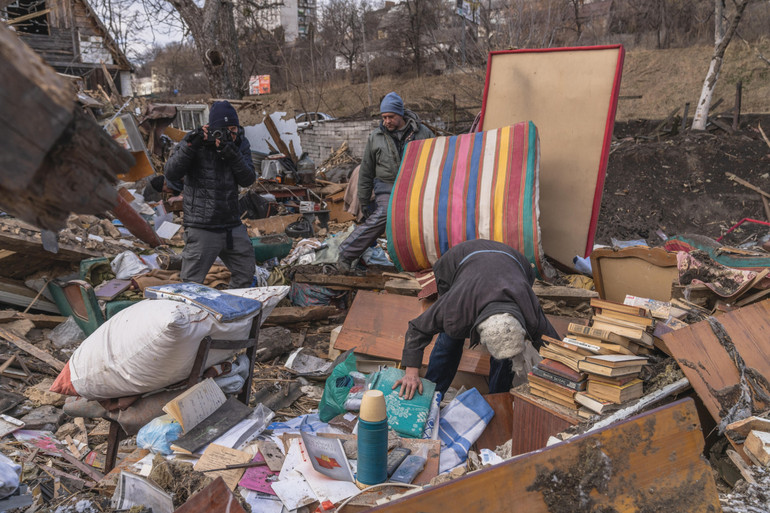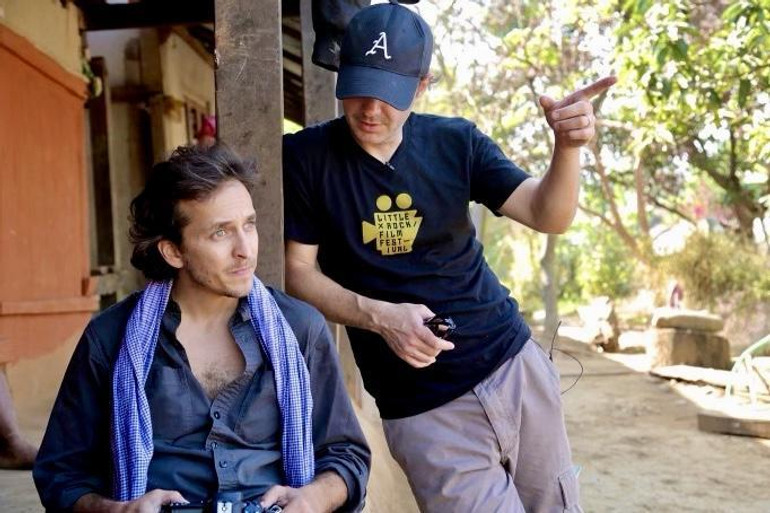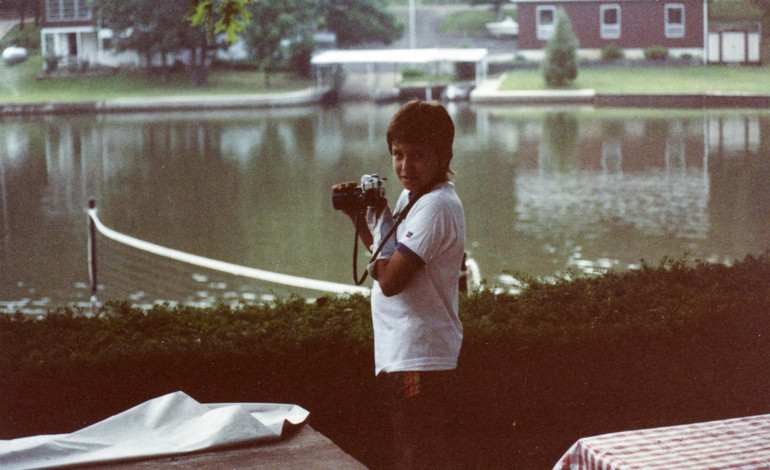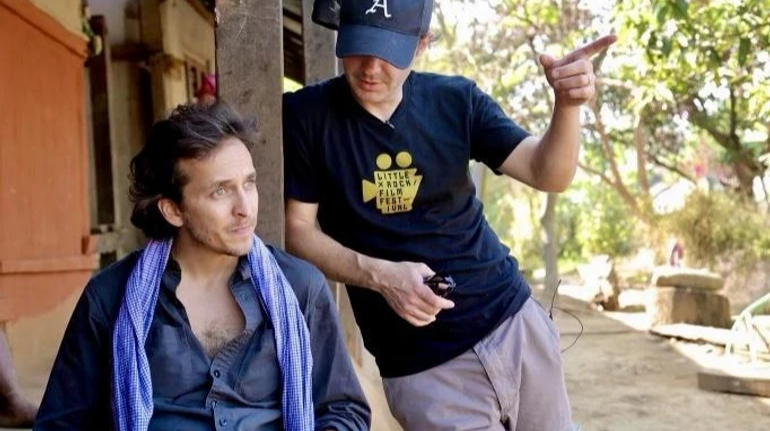“
Dedicated not only to Brent, but also to all journalists, as representatives of one of the most dangerous professions, the film in just 38 minutes gives an idea of the specifics of journalistic work, which illuminates the dark sides of military conflicts. And this is valuable right now, precisely for Ukrainians who are defending themselves against the onslaught of Russians and who, at various points in the theater of military operations, are showing the nightmare of war to the rest of the world.
It is noteworthy that Brent Reno did not have time to film much in Ukraine after the start of the full-scale invasion. At least only a few pieces made it into the film. Here is a middle-aged man standing somewhere in the private sector next to a huge torrent. In its place there was a house, now it is completely destroyed by the arrival.
“Is this your house?” Brent asks. “Yes, this is my house,” the man replies quietly in shock, automatically pointing to the empty hole. And adds: “But there is no house”.
Another old man walks through the ruins of destroyed buildings and his speech is more emotional. Throwing his hands up, he says: “Cursed be that Russian land!”. At the same time, the subtitle is in English “curse the Russians”i.e “curse to the Russians”this shows Americans’ ignorance of the context of the man’s curse, which comes directly from the mass of Russian fairy tales, cartoons and, in general, any propagated propaganda meme about “Russian land”.
 Brent Reno films the consequences of the Russian war in Ukraine
Brent Reno films the consequences of the Russian war in Ukraine
NVO Mach
Brent would have understood the nuances of this war, but he was not given it: when he was driving through Irpin in a car with his colleague, also an American journalist, a Russian soldier’s bullet pierced the windshield of the car and hit him squarely in the head. He died immediately. The body was taken to Kyiv Okhmadit. The President of Ukraine said this in his daily report. It was reported on the British Sky TV channel and the American CNN, and the adviser of the White House on communications in the field of national security, John Kirby, spoke at the Pentagon.
 Brent and Craig Reno
Brent and Craig Reno
NVO Mach
But, although a lot has already been shown, the film begins at this very moment, as if after the prologue. Brent’s younger brother came to Kyiv, Craigalso a director and screenwriter, his partner in the company Renaud Brothers Films and on most of Brent’s films and tours to war zones. I stood next to his coffin in the Okhmadity morgue, cried, and then picked up the camera. Someone filming this asked: “What are you doing?” “I am filming so that people will know who he was and what he did, how he filmed about violence and about war. I want to make a film about it”. This is how the movie begins, for the second time. Like a second life, screen.
Craig is making a film because it is necessary to tell how much the brother has done in his life, for the good of society, individuals, and also for the honor of his name.
 Young Brent Reno
Young Brent Reno
HBO Max
Archival photos and video footage from childhood, youth and professional work show a wide picture of Brent’s activities (and without even involving all the information, in fact, larger and wider, for example, presented on his page in “Wikipedia”).
Here he is as a child in Arkansas on a bicycle and horse, here is a 10-year-old holding his first camera, then a camera, and then, already an adult, crossing a river somewhere in Mexico with a boy to the US border with a Go-Pro in his hand. Then he goes to Honduras in a car with policemen who have undertaken to protect a family threatened by the drug mafia.
In 2005, together with the American military, he came under fire in Iraq. One of the marines next to him dies… The war in Haiti – Brent is there, in Afghanistan – there too. In Somalia in 2017, he filmed at the very second when the biggest terrorist act in the country took place – two cars were blown up in Mogadishu, killing more than 500 people.
For more than 20 years, Brent has filmed humanitarian disasters, wars and unrest around the world, made reports and films, winning dozens of awards at festivals, a Pulitzer Prize, invitations to collaborate and to teach. What’s more, he started a film festival and a university in his hometown of Little Rock!
However, this is not important. That is, not only that. In the second half of the film, when Brent’s coffin, covered with the stars and stripes flag, was brought home, in the local church, during the funeral, speeches began to be made – by his fellow cinematographers, the heroes of his reports and even military officers with whom he was under bullets together. And these speeches spoke of Brent’s human purity and his professional dedication.
This is important, important for him and for all other journalists, whose profession is the most dangerous and deadly. After the military. But Brent had no weapon, was, as the film called, “armed only with a camera,” and still “demanded truth and peace,” as the finale says. Let him not achieve peace. But he was honest in his work. Honor!
”, — write: www.pravda.com.ua
Dedicated not only to Brent, but also to all journalists, as representatives of one of the most dangerous professions, the film in just 38 minutes gives an idea of the specifics of journalistic work, which illuminates the dark sides of military conflicts. And this is valuable right now, precisely for Ukrainians who are defending themselves against the onslaught of Russians and who, at various points in the theater of military operations, are showing the nightmare of war to the rest of the world.
It is noteworthy that Brent Reno did not have time to film much in Ukraine after the start of the full-scale invasion. At least only a few pieces made it into the film. Here is a middle-aged man standing somewhere in the private sector next to a huge torrent. In its place there was a house, now it is completely destroyed by the arrival.
“Is this your house?” Brent asks. “Yes, this is my house,” the man replies quietly in shock, automatically pointing to the empty hole. And adds: “But there is no house”.
Another old man walks through the ruins of destroyed buildings and his speech is more emotional. Throwing his hands up, he says: “Cursed be that Russian land!”. At the same time, the subtitle is in English “curse the Russians”i.e “curse to the Russians”this shows Americans’ ignorance of the context of the man’s curse, which comes directly from the mass of Russian fairy tales, cartoons and, in general, any propagated propaganda meme about “Russian land”.
 Brent Reno films the consequences of the Russian war in Ukraine
Brent Reno films the consequences of the Russian war in Ukraine
NGO Ma h
Brent would have understood the nuances of this war, but he was not given it: when he was driving through Irpin in a car with his colleague, also an American journalist, a Russian soldier’s bullet pierced the windshield of the car and hit him squarely in the head. He died immediately. The body was taken to Kyiv Okhmadit. The President of Ukraine said this in his daily report. It was reported on the British Sky TV channel and the American CNN, and the adviser of the White House on communications in the field of national security, John Kirby, spoke at the Pentagon.
 Brent and Craig Reno
Brent and Craig Reno
NVO Mach
But, although a lot has already been shown, the film begins at this very moment, as if after the prologue. Brent’s younger brother came to Kyiv, Craigalso a director and screenwriter, his partner in the company Renaud Brothers Films and on most of Brent’s films and tours to war zones. I stood next to his coffin in the Okhmadity morgue, cried, and then picked up the camera. Someone filming this asked: “What are you doing?” “I am filming so that people will know who he was and what he did, how he filmed about violence and about war. I want to make a film about it”. This is how the movie begins, for the second time. Like a second life, screen.
Craig is making a film because it is necessary to tell how much the brother has done in his life, for the good of society, individuals, and also for the honor of his name.
 Young Brent Reno
Young Brent Reno
HBO Max
Archival photos and video footage from childhood, youth and professional work show a wide picture of Brent’s activities (and without even involving all the information, in fact, larger and wider, for example, presented on his page in “Wikipedia”).
Here he is as a child in Arkansas on a bicycle and horse, here is a 10-year-old holding his first camera, then a camera, and then, already an adult, crossing a river somewhere in Mexico with a boy to the US border with a Go-Pro in his hand. Then he goes to Honduras in a car with policemen who have undertaken to protect a family threatened by the drug mafia.
In 2005, together with the American military, he came under fire in Iraq. One of the marines next to him dies… The war in Haiti – Brent is there, in Afghanistan – there too. In Somalia in 2017, he filmed at the very second when the biggest terrorist act in the country took place – two cars were blown up in Mogadishu, killing more than 500 people.
For more than 20 years, Brent has filmed humanitarian disasters, wars and unrest around the world, made reports and films, winning dozens of awards at festivals, a Pulitzer Prize, invitations to collaborate and to teach. What’s more, he started a film festival and a university in his hometown of Little Rock!
However, this is not important. That is, not only that. In the second half of the film, when Brent’s coffin, covered with the stars and stripes flag, was brought home, in the local church, during the funeral, speeches began to be made – by his fellow cinematographers, the heroes of his reports and even military officers with whom he was under bullets together. And these speeches spoke of Brent’s human purity and his professional dedication.
This is important, important for him and for all other journalists, whose profession is the most dangerous and deadly. After the military. But Brent had no weapon, was, as the film called, “armed only with a camera,” and still “demanded truth and peace,” as the finale says. Let him not achieve peace. But he was honest in his work. Honor!
